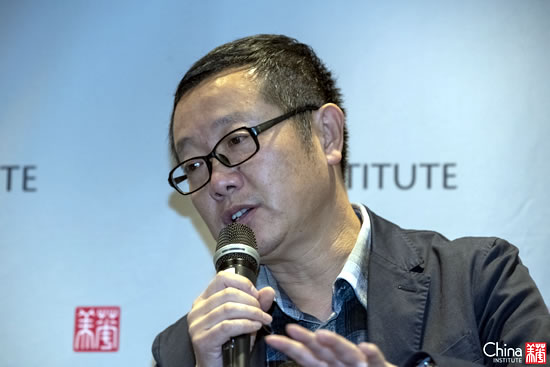Sci Fi Author Sensation Cixin Liu Speaks At NYC’s China Institute
By Sybil Maimin

Author Cixin Liu (Photo: © All rights reserved by ChinaInstituteNYC)
“Sci Fi” is “hot” in China, and in New York, an enthusiastic, overflow crowd of mostly students and young professionals came to the China Institute to hear Chinese science fiction author and national literary sensation Cixin Liu speak about his work (in Chinese, translated into English). In a lively, well-paced conversation with New Yorker magazine writer Jiayang Fan, Liu explained he writes “hard” science fiction, a category that emphasizes scientific accuracy and imagination based on real theories. He trained as an electrical engineer and brings his scientific knowledge and outlook to his writing. His first contact with science fiction came when, as a child, he read Jules Verne’s Journey to the Center of the Earth. The style was realistic and, being unfamiliar with the genre, he accepted the book as complete truth. When told that much of the work was the author’s imagination, he was “astonished at the real world a writer can construct.” Among the first generation of science fiction fans in China, he discovered the more he read in the genre, the more he developed an imaginary world. He shared that, “Arthur Clark’s 2001: a Space Odyssey got me going. It brought out my yearning to write science fiction books. All my works are modeled after Space Odyssey.” Liu noted that American and Chinese science fiction have much in common, with similar styles and themes. Differences are mostly reflections of cultural taboos. He attributed the 1990’s renaissance of science fiction among the new generation in his country to booming development and hope for the future. “We all feel drastic change. It is very different from the world of our childhood, very fertile ground for science fiction. Also, the new generation subconsciously feels part of all humanity, not just of China. They pay more attention to problems of life than the previous generation, all characteristics of science fiction.”
In explaining the references to history, political theory, art history, sociology, and such, in his novels, Liu said, “Ultimately, I’m interested in science and include the other subjects only when they intersect with science. I didn’t start to write because of love of literature. It was love of science.” George Orwell impacted him with 1984 by describing reality and the future in a different way from traditional authors. The book shocked many people, leading to discussions, panels, and, perhaps, surmised Liu, a different actual 1984. Questioned by Fan about the focus on “survival” in his books rather than morality or ethics, Liu said, “Survival is the most important thing for a civilization. If you disappear, no other species will care about how moral you were. If there are other civilizations in the universe, survival is also primary for them.” Referencing contemporary reality and climate change, Fan asked if, as the last generation with power to influence climate, we should try to preserve the earth for our children’s futures or be more concerned with our own lives and survival. Liu rejected both options, saying sustainability actions can only buy time, but not solve environmental problems which, he maintained, are caused by both man and nature. Tapping into his sci fi outlook and imagination, he advised that, for long-term survival, we move our polluting industries to outer space, thereby solving environmental problems and also developing space as a useful niche for future activities.
Engaging and forthright, Liu denied using his work is for messaging or politics, as is frequently done in China. “I write science fiction as an end and not a means to an end,” he said. “The many reflections of reality in my books are used as platforms where my imagination takes off. I want to explore worlds beyond our own. Science fiction is a specific genre of literature that allows imagination to explore spaces and time we could enter. It describes the relationship between the small “us” and the larger universe. My ultimate goal is just to tell a good story.”
Cixin Liu has won many literary awards including the 2015 Hugo Award for Best Novel for The Three-Body Problem. The mission of the China Institute, founded in 1926, is to help Americans gain a better understanding of China through “human to human connections.” #
